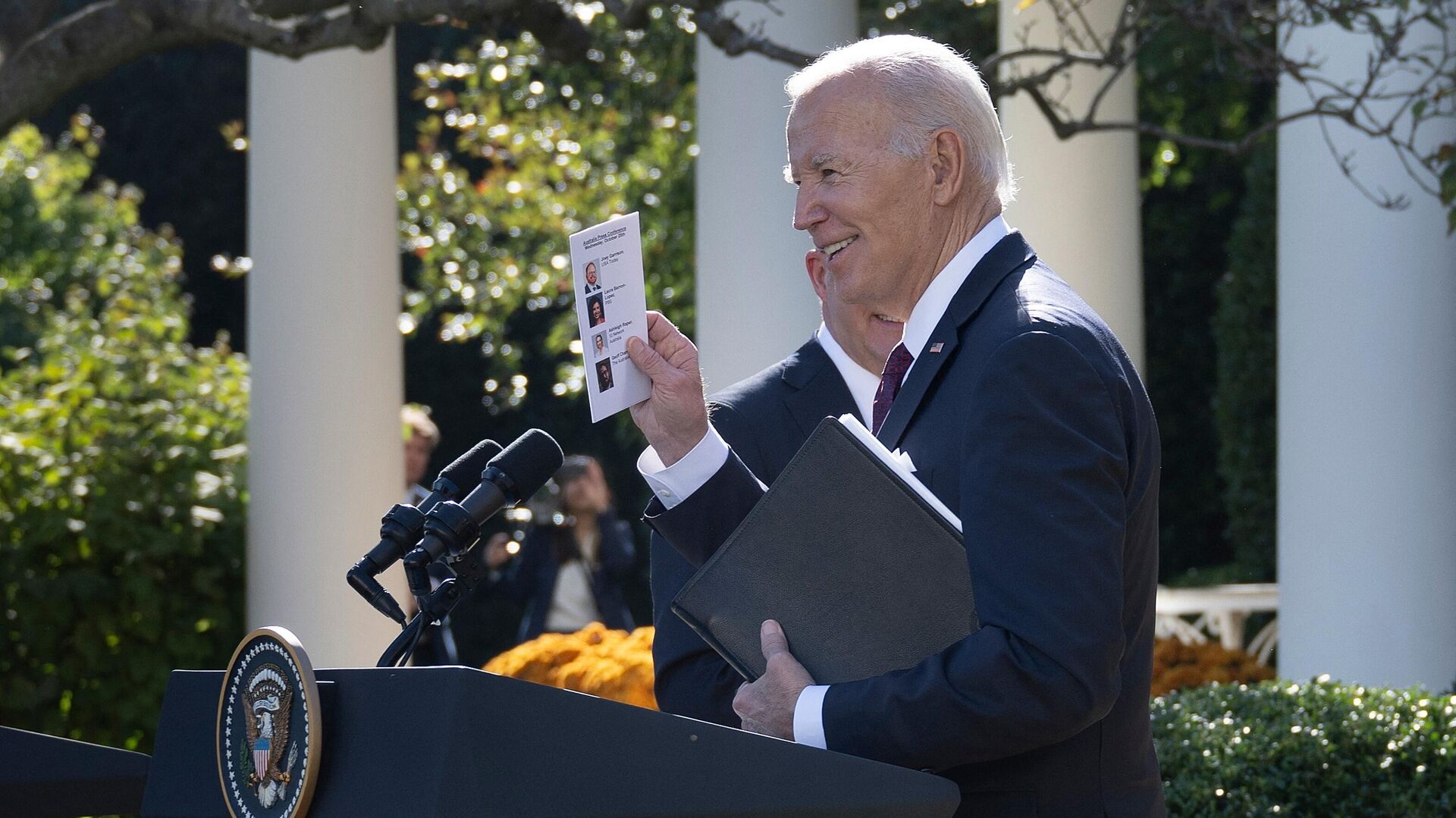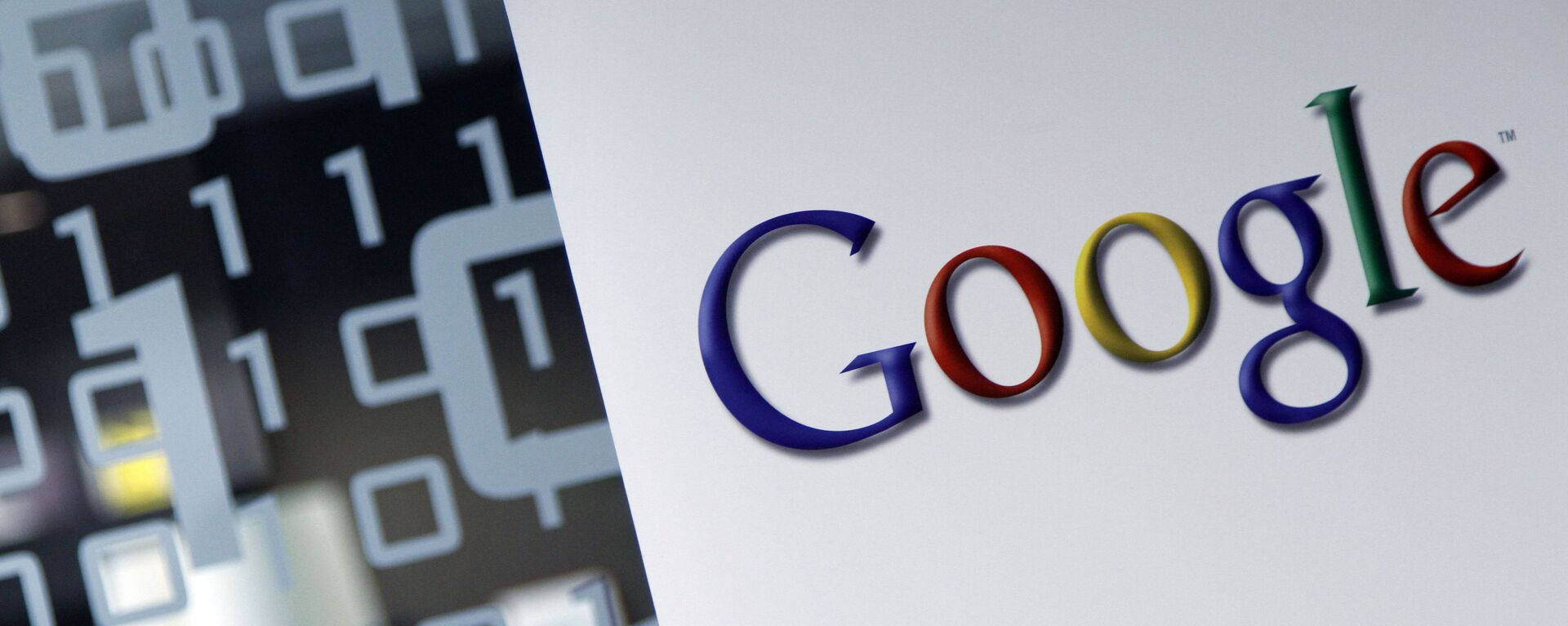https://sputnikglobe.com/20231030/biden-to-sign-first-executive-order-on-artificial-intelligence-systems-1114600421.html
Biden to Sign First Executive Order on Artificial Intelligence Systems
Biden to Sign First Executive Order on Artificial Intelligence Systems
Sputnik International
Following a chatbot's meteoric rise last year, the global legislative arena has been abuzz, pondering the repercussions of AI on the workforce, amplify false information, and chart a course toward a distinct cognitive capability.
2023-10-30T18:39+0000
2023-10-30T18:39+0000
2023-10-30T18:39+0000
world
newsfeed
us
americans
rishi sunak
joe biden
united kingdom (uk)
israel
china
european union (eu)
https://cdn1.img.sputnikglobe.com/img/07e7/0a/1b/1114538339_0:140:3145:1909_1920x0_80_0_0_acac71a4fc2aa338d98003ccadd7f9d7.jpg
President Joe Biden is poised to release an executive order on Monday, marking a debut of federal guidelines on artificial intelligence. Key among these provisions is the necessity to rigorously vet top-tier AI technologies to prevent their potential misuse in developing biological or nuclear arms.Biden is expected to present the government's broadest steps yet to mitigate potential AI-related risks faced by Americans, given the technology's significant strides recently. Central to this expansive move is the focus on stringent testing protocols.Media reports suggest that the new guidelines suggest watermarking photos, videos, and audio produced by AI to indicate their origin transparently. This emerges from growing concerns about AI's potential to amplify “deep fakes” and misleading content in the run-up to the 2024 presidential race. The latest guidelines make provision for cloud service providers, which will now be mandated to inform the government of their international clientele.The directive will be released just days before a global AI safety summit headed by the UK's Prime Minister Rishi Sunak. While the European Union has been proactive in crafting new AI regulations, the US is following countries like China and Israel, which have presented their own regulatory framework plans.According to media outlets, White House Deputy Chief of Staff Bruce Reed said that “President Biden is rolling out the strongest set of actions any government in the world has ever taken on AI safety, security and trust...It’s the next step in an aggressive strategy to do everything on all fronts to harness the benefits of AI and mitigate the risks.”The new US regulations target advanced future systems, with some rules set for implementation in the next three months. While these rules mainly address future systems, they do not extensively cover the current risks of chatbots that could "circulate disinformation." The order impacts American firms, but given the global nature of software development, there will be diplomatic challenges for the US in enforcing these regulations. Additionally, these regulations aim to set initial standards in safety, security, and consumer protection in the tech sector. Through its financial influence, the White House's instructions to federal agencies intend to ensure companies adhere to the standards set by their governmental clients.Lauren Kahn, a senior research analyst at the Center for Security and Emerging Technology at Georgetown University, disclosed to news sources that “This is an important first step and, importantly, executive orders set norms.”The order directs the Department of Health and Human Services, alongside other agencies, to formulate AI safety standards and streamline AI tool acquisition. The Department of Labor and the National Economic Council are tasked with analyzing AI's influence on the labor market and devising potential regulations. Additionally, agencies are called upon to give guidance against algorithmic discrimination to landlords, government contractors, and federal benefits programs.However, the White House has reportedly acknowledged its limitations in enforcing certain directives, such as strengthening guidelines for personal consumer data protection, emphasizing the need for legislative measures for complete data safety. Additionally, while aiming to boost innovation and competition, it has suggested an enhanced role for the Federal Trade Commission (FTC) in overseeing consumer protection and antitrust issues, despite not having the authority to mandate regulations for the independent agency.Ms. Lina Khan, the FTC chair, has signposted readiness for a proactive approach to AI-related issues. She told news outlets in May that “Although these tools are novel, they are not exempt from existing rules, and the FTC will vigorously enforce the laws we are charged with administering, even in this new market.” Subsequently, the commission initiated a probe into OpenAI, the developers behind ChatGPT, amid concerns about potential privacy breaches and allegations of propagating inaccurate information regarding individuals.Within the tech landscape, major companies like Microsoft, Google, and OpenAI are championing voluntary security standards. While there is consensus on the importance of regulations, the depth of government involvement remains a point of contention. To demonstrate their commitment, these firms have opened their systems to third-party scrutiny for potential flaws.With AI technologies constantly evolving, US lawmakers and White House authorities suggest a measured approach to legislation. This viewpoint is underscored by the EU's omission of large language models in their preliminary drafts. As per media reports, Senate Majority Leader Chuck Schumer (D-NY) expressed that “If you move too quickly in this, you may screw it up.”
https://sputnikglobe.com/20230726/ai-wont-acquire-human-like-consciousness-soon-but-tech-may-likely-be-misused---un-envoy-1112148197.html
https://sputnikglobe.com/20230817/googles-deepmind-developing-ai-that-can-give-life-advice-1112658925.html
https://sputnikglobe.com/20220723/google-fires-engineer-who-fears-companys-ai-could-be-sentient-1097716315.html
united kingdom (uk)
israel
china
Sputnik International
feedback@sputniknews.com
+74956456601
MIA „Rossiya Segodnya“
2023
Chimauchem Nwosu
https://cdn1.img.sputnikglobe.com/img/07e7/09/01/1113046371_0:99:1536:1635_100x100_80_0_0_9c5c627283eca931c39fe4852bbb301c.jpg
Chimauchem Nwosu
https://cdn1.img.sputnikglobe.com/img/07e7/09/01/1113046371_0:99:1536:1635_100x100_80_0_0_9c5c627283eca931c39fe4852bbb301c.jpg
News
en_EN
Sputnik International
feedback@sputniknews.com
+74956456601
MIA „Rossiya Segodnya“
Sputnik International
feedback@sputniknews.com
+74956456601
MIA „Rossiya Segodnya“
Chimauchem Nwosu
https://cdn1.img.sputnikglobe.com/img/07e7/09/01/1113046371_0:99:1536:1635_100x100_80_0_0_9c5c627283eca931c39fe4852bbb301c.jpg
president biden, artificial intelligence, ai, deep fakes, cloud service providers, global ai safety summit, prime minister rishi sunak, european union, white house deputy chief of staff, bruce reed, ai chatbots, 2024 us presidential campaign, federal trade commission, vice president kamala harris, ai consumer protection, lauren kahn, center for security and emerging technology, georgetown university, department of health and human services, department of labor, national economic council, algorithmic discrimination, data protection, ftc, lina khan, openai, chatgpt, microsoft, google, meta, adobe, palantir, ibm, inflection ai, nvidia, amazon, anthropic, national security memorandum, ai compeition, ai safety standards, ai tool acquisition, ai influence, ai experts, ai technologies
president biden, artificial intelligence, ai, deep fakes, cloud service providers, global ai safety summit, prime minister rishi sunak, european union, white house deputy chief of staff, bruce reed, ai chatbots, 2024 us presidential campaign, federal trade commission, vice president kamala harris, ai consumer protection, lauren kahn, center for security and emerging technology, georgetown university, department of health and human services, department of labor, national economic council, algorithmic discrimination, data protection, ftc, lina khan, openai, chatgpt, microsoft, google, meta, adobe, palantir, ibm, inflection ai, nvidia, amazon, anthropic, national security memorandum, ai compeition, ai safety standards, ai tool acquisition, ai influence, ai experts, ai technologies
Biden to Sign First Executive Order on Artificial Intelligence Systems
Following a chatbot's meteoric rise last year, the global legislative arena has been abuzz, pondering the repercussions of AI on the workforce.
President Joe Biden is poised to release an executive order on Monday, marking a debut of federal guidelines on artificial intelligence. Key among these provisions is the necessity to rigorously vet top-tier AI technologies to prevent their potential misuse in developing biological or nuclear arms.
Biden is expected to present the government's broadest steps yet to mitigate
potential AI-related risks faced by Americans, given the technology's significant strides recently. Central to this expansive move is the focus on stringent testing protocols.
Media reports suggest that the new guidelines suggest watermarking photos, videos, and audio produced by AI to indicate their origin transparently. This emerges from growing concerns about AI's potential to amplify “deep fakes” and misleading content in the run-up to the 2024 presidential race. The latest guidelines make provision for cloud service providers, which will now be mandated to inform the government of their international clientele.
The directive will be released just days before a global AI safety summit headed by the UK's Prime Minister Rishi Sunak. While the European Union has been proactive in crafting new AI regulations, the US is following countries like
China and
Israel, which have presented their own regulatory framework plans.
According to media outlets, White House Deputy Chief of Staff Bruce Reed said that “President Biden is rolling out the strongest set of actions any government in the world has ever taken on AI safety, security and trust...It’s the next step in an aggressive strategy to do everything on all fronts to harness the benefits of AI and mitigate the risks.”
The new US regulations target advanced future systems, with some rules set for implementation in the next three months. While these rules mainly address future systems, they do not extensively cover the current risks of chatbots that could "circulate disinformation."
The order impacts American firms, but given the global nature of software development, there will be diplomatic challenges for the US in enforcing these regulations. Additionally, these regulations aim to set initial standards in safety, security, and consumer protection in the tech sector. Through its financial influence, the White House's instructions to federal agencies intend to ensure companies adhere to the standards set by their governmental clients.

17 August 2023, 01:56 GMT
Lauren Kahn, a senior research analyst at the Center for Security and Emerging Technology at Georgetown University, disclosed to news sources that “This is an important first step and, importantly, executive orders set norms.”
The order directs the Department of Health and Human Services, alongside other agencies, to formulate AI safety standards and streamline AI tool acquisition. The Department of Labor and the National Economic Council are tasked with
analyzing AI's influence on the labor market and devising potential regulations. Additionally, agencies are called upon to give guidance against algorithmic discrimination to landlords, government contractors, and federal benefits programs.
However, the White House has reportedly acknowledged its limitations in enforcing certain directives, such as strengthening guidelines for personal consumer data protection, emphasizing the need for legislative measures for complete data safety. Additionally, while aiming to boost innovation and competition, it has suggested an enhanced role for the Federal Trade Commission (FTC) in overseeing consumer protection and antitrust issues, despite not having the authority to mandate regulations for the independent agency.
Ms. Lina Khan, the FTC chair, has signposted readiness for a proactive approach to AI-related issues. She told news outlets in May that “Although these tools are novel, they are not exempt from existing rules, and the FTC will vigorously enforce the laws we are charged with administering, even in this new market.” Subsequently, the commission initiated a probe into OpenAI, the developers behind ChatGPT, amid concerns about potential privacy breaches and allegations of propagating inaccurate information regarding individuals.
Within the tech landscape, major companies like Microsoft,
Google, and OpenAI are championing voluntary security standards. While there is consensus on the importance of regulations,
the depth of government involvement remains a point of contention. To demonstrate their commitment, these firms have opened their systems to third-party scrutiny for potential flaws.
With AI technologies constantly evolving,
US lawmakers and White House authorities suggest a measured approach to legislation. This viewpoint is underscored by the
EU's omission of large language models in their preliminary drafts. As per media reports,
Senate Majority Leader Chuck Schumer (D-NY) expressed that
“If you move too quickly in this, you may screw it up.”





